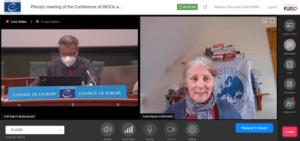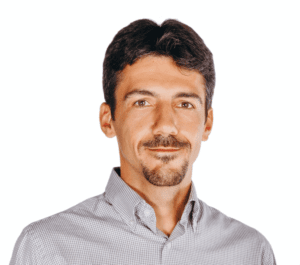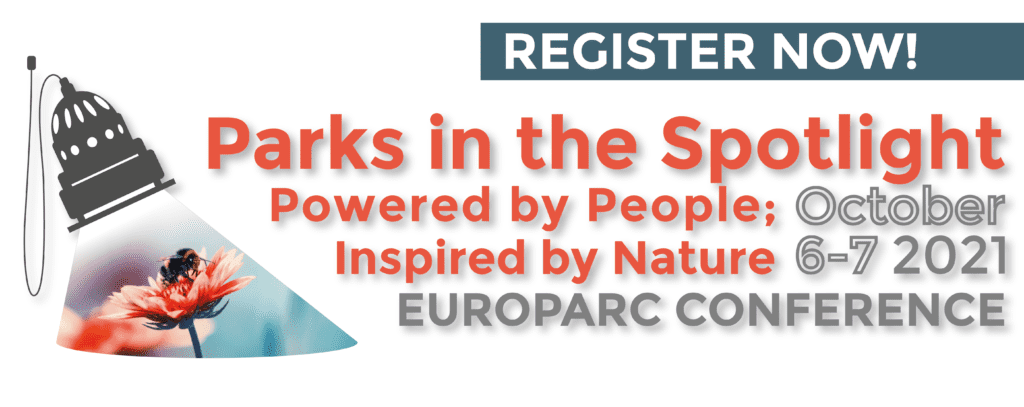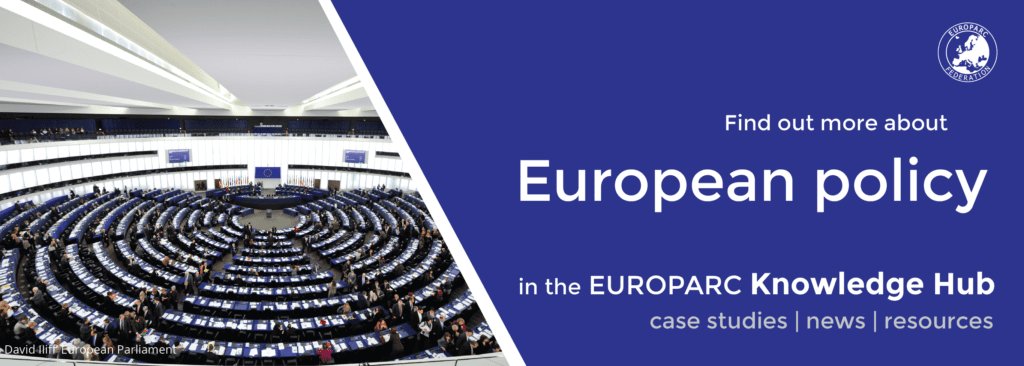New EUROPARC Podcast! Interview with Ignace Schops
In EUROPARC Podcasts: Voices from the Parks, you can listen to inspiring stories from across the network when you’re on the go. For this new episode we’ve interviewed our president Ignace Schops.
EUROPARC Podcasts – Voices from the Parks
Are you tired of watching the screen and sitting at your desk every time you want to learn more about interesting but complex topics from the network? Then the EUROPARC Podcasts: Voices from the Parks is just the thing for you! Sit back and relax, go for a walk or even cook your dinner – while we bring the Voices from the Parks to you.
This episode’s voice comes from Ignace Schops, Director at Regionaal Landschap Kempen en Maasland and current EUROPARC President. Ignace’s mandate is ending next week as a new president will be elected during our General Assembly. High time to ask him some questions about his career, his time at EUROPARC and the importance of connections, networking and social change to achieve nature conservation goals.
We need to bridge wildlife with all other sectors – we cannot protect wildlife on our own, we need others!
Listen to the interview now:
The podcast is available on Spotify, Anchor and almost all other mayor podcast platforms. You can also find the other episodes of our podcast there.
Connecting Human Rights and Nature inside the Council of Europe
The new Environment, Climate Change, Heritage and Health Committee inside the Conference of INGOs of the Council of Europe, chaired by EUROPARC Federation, aims to develop an integrated approach between human rights, environment, heritage and health in the Bern, Florence, Aarhus and Faro Conventions.
The climate change emergency, the perilous state of biodiversity, the ongoing land consumption and even more recent, the COVID-19 pandemic, have highlighted the intrinsic need of and link between human health, heritage and nature.
All of these critical topics – environment, climate change, heritage, and health -, have inequalities in terms of access and effects embedded in them, and moreover, their governance needs to be founded in sound participatory democratic principles. Democracy, human rights and the rule of law are deeply applicable and need to be ensured across these important themes in our societies.

presentation of the new Committee by Carol Ritchie at the Assembly of INGOs, April 2021
Thus, a new Thematic Committee inside the Conference of INGOs of the Council of Europe, dedicated to bridge the perceived nature-culture divide, improve mutual understanding, gather, and disseminate good practice, ensure a check and balance for public institutions, and provide a cross sectoral platform, was definitely urgent from EUROPARC’s perspective.
Therefore, thanks to the initiative of the EUROPARC Federation, the new Environment, Climate Change, Heritage and Health Committee (ECCH&CH) has been officially approved on 28th of April 2021 by the INGOs General Assembly.
By bringing together INGO’s from a range of different sectors, the ECCH&H Committee seeks an integrated approach. It addresses the human rights aspect of environment and heritage in the framework of the Bern, Florence, Aarhus and Faro Conventions and, references the Sustainable Development Goals, climate change commitments and the need for greater connectivity between people and nature.
The Committee aims to overcome the nature/culture divide that hinders collaboration and progress towards a shared vision that protects human rights, upholds democracy and the rule of law. It wants to raise awareness and encourage the development of Europe’s cultural identity and shared values.
The Committee has started working on the analysis of the gaps and potentialities of the Council of Europe (CoE) Conventions. It has already identified some crucial needs that will be at the core of the Committee’s actions:
- to re-launch the importance of the Conventions among public authorities and civil society, in particular the Bern Convention;
- to update and connect key concepts of the Conventions, i.e. “equality” with climate change impacts;
- to enable different experts to work together to develop the synergies and create a toolbox composed by the different CoE Conventions.
The members of the Committee will also act to generate synergies between the ECCH&H Committee and different European Union NGOs Platforms.
Members of the ECCH&H Committee are:
EUROPARC Federation
Friends of the Earth/Pro Natura
The Conference of International Non-Governmental Organisations (INGOs) of the Council of Europe is the representative body of the INGOs enjoying participatory status with the Council of Europe. EUROPARC is a member since 2013.
The substantive work on particular issues is undertaken in Committees. They provide a focus for discussion and research on issues relevant to the work of the Council of Europe. They prepare reports and where appropriate, draft declarations, recommendations and resolutions for consideration by the General Assembly.
Nature-based Solutions at the forefront- IUCN World Conservation Congress
The world changes one discussion at a time, one meeting at a time, one congress at a time. In this article, you can find a recap of the IUCN World Conservation Congress.
This year’s IUCN World Conservation Congress postponed from 2020 to 2021 due to Corona, took place in the form of a hybrid event in Marseille (FR) and online. It was the first such type of big event in the nature conservation sector.
This major event focused on three themes, biodiversity conservation plan, nature-based solutions for a global post-Covid19 recovery, and the need for financial investment in nature. Paving the way for further discussions at the UN Climate Change (COP 26) in the UK in November 2021, and shaping negotiations for the global biodiversity framework to be adopted at the UN Biodiversity Conference (COP 15) in China in April 2022. It had a number of high-profile speakers, like Emmanuel Macron, Harrison Ford, and Frans Timmermans.
Nature-based Solutions at the forefront
A fast array of issues were discussed, and during the Congress a total of 148 resolutions and commitments were adopted and published in the Marseille Manifesto.
An update of the IUCN Red List for threatened species was also announced, which saw a slight recovery of some tuna fish species, but also an increasing danger for other marine animals like shark and rays species. The situation for the Komodo dragon also continues to worsen as a result of climate change.
Indeed, the decline in biodiversity, the climate crisis, and human health are inextricably interconnected. This is why it is so important to invest in Nature-based Solutions (NBS) and include everyone in the process: indigenous people, young people, governments, civil society, businesses, and experts, a notion that was underlined during the entirety of the Congress:
Biodiversity is a multidimensional problem.
said Razan Al Mubarak. Razan is the first Arab woman to be elected President of IUCN during the Members Assembly. Some other “personnel changes” include the appointment of Dr. Madhu Rao as new Chair of the World Commission on Protected Areas (WCPA), with a European representative for the Commission appointed in due course.
EUROPARC would like to take this opportunity to thank the past IUCN World Commission on Protected Areas (WCPA) Regional Vice-Chair Europe Andrej Sovinc, for his sterling work, and immense efforts to promote and strengthen Protected Areas both within and outside of the IUCN.
Participation of EUROPARC’s Council

EUROPARC Vice President Michael Hošek
From EUROPARC, our Council Member Pete Rawcliffe was involved as a panellist in the session “Nature is Good Medicine” highlighting the importance of NBS to care for both people and the environment. EUROPARC vice-president Michael Hošek was also present at the event, he reported on the main highlights concerning European Protected Areas.
These included:
- The approval of the IUCN 4-year plan for Europe, which reflects the activities foreseen in the European region and its influence on the rest of the world. The program highlights the need for strong partnerships, covering and consensus building among stakeholders and working across sectors to pursue the sustainable use of land and its restoration, the integration of nature in cities, a reshaping of our economy and future healthy oceans, and tackling climate change.
EUROPARC will look closely at how this may intersect with our own strategy.
- The approval of Motion 130 “Strengthening sustainable tourism’s role in biodiversity conservation and community resilience”, which was co-sponsored by EUROPARC (find out more from Anna Spenceley’s Chair of the IUCN WCPA Tourism and Protected Areas Specialist Group post here).
- The approval of Motion A “Including subnational and local governments to IUCN’s membership”. This opens more workspace with periurban areas and regional or local nature parks, which have become increasingly essential tools for local communities’ involvement, greening urban areas, and climate change adaptation.
- The voting for a temporary suspension of deep seabed mining. Specifically, the Netherlands government was requested to better protect the Wadden Sea area from fossil fuel mining practices. The area is classified as a UNESCO World Heritage Site. You can find more info here.
Our vice-president noted that: “Despite the technological challenges, the congress showed a way forward, i.e., how to be more environmentally friendly while still participating, travelling is not always needed. Let’s use it as an inspiration for the future when making our travel strategies greener while not limiting our ability to be visible, active, and influential.”
The event closed with a clear plea to governments for a post-Covid recovery focused on Nature-based Solutions.
The outcomes of this global event are a good start for the run for the change that our planet desperately needs.
More information about the IUCN World Conservation Congress
EUROPARC Conference 2021
Protected Areas are at the forefront of NBS, if you want to learn how to make the most of them join the EUROPARC Conference 2021. You can register REGISTER HERE.

Next Webinar: Comment dépasser les frontières et développer la coopération entre les aires protégées frontalières ?
Scarpe - Escaut Plains European nature Park - Bruno Bosilo
EUROPARC’s webinars are back after a summer break! Our first webinar will focus on Transboundary Cooperation and will be held entirely in French.
- 28. Septembre
- 14:30 CET
- Register for free here
Dans le cadre de l’Année internationale de la paix et de la confiance 2021, il est important de parler du rôle des aires protégées transfrontalières pour le dialogue international et la protection de la nature, ainsi que de la manière dont nous pouvons améliorer la coopération transfrontalière.
Dans ce webinaire organisé par la Fédération EUROPARC et la section francophone d’EUROPARC, nous allons réfléchir sur ces questions, présenter le programme transfrontalier EUROPARC et ce que l’expérience et l’engagement du réseau des aires protégées transfrontalières (TransParcNet) peuvent apporter aux zones transfrontalières de la France avec Andorre, l’Espagne, l’Italie, l’Allemagne, la Suisse, la Belgique, mais aussi avec le Royaume-Uni, ainsi que le Brésil et le Surinam.
Le webinaire contiendra des éléments participatifs, nous avons hâte de vous entendre !
Programme
Welcome
Par Stefania Petrosillo – Fédération EUROPARC et par Matthieu Creuge – PNR Pyrénées Ariégeoises / Fédération des parcs naturels régionaux de France
Présentation du Programme de EUROPARC « Parcs Transfrontaliers – Suivant la conception de la nature »
Par Stefania Petrosillo – Fédération EUROPARC
L’Europe est un continent complexe avec des milliers d’années d’interaction humaine qui a créé de nombreuses frontières politiques. Cependant, la nature ne reconnaît jamais ces artefacts et les frontières créent des barrières artificielles à la gestion de ces précieuses ressources naturelles. Le programme et certificat transfrontalier EUROPARC «Parcs Transfrontaliers – Suivant la conception de la nature» est une méthodologie et une certification qui soutiennent les aires protégées transfrontalières dans un processus de compréhension mutuelle, de coopération et de gestion collaborative. Les parcs certifiées donnent lieu au réseau TransParcNet.
Etude de cas 1: Le Parc Naturel Transfrontalier Binntal Veglia Devero (IT/CH) : Préserver ensemble le patrimoine géologique, naturel et culturel des Alpes et participer au réseau TransParcNet de EUROPARC
Par Andreas Weissen et Daniele Piazza – Parc Naturel Transfrontalier Binntal Veglia Devero
Le Parc Naturel Transfrontalier Binntal Veglia Devero englobe le Parco Naturale Veglia Devero / Aires protégées d’Ossola, région du Piémont, Italie et le Landschaftspark Binntal, canton du Valais, Suisse. Cet environnement naturel est dominé par des rochers, des glaciers et des montagnes atteignant quelque 3.500 mètres d’altitude, des terres alpines, des pâturages, des tourbières et des prairies de fauche.
Un premier accord officiel de coopération transfrontalière entre les deux parcs date de 2013, mais les contacts et échanges de personnes des deux côtés de la chaîne alpine à travers le col d’Arbola/Albrun remontent à plus de 3000 ans. Depuis 2019 est membre très actif du réseau EUROPARC TransParcNet.
Etude de cas 2: 30 ans de coopération transfrontalière« à petits pas » jusqu’à la création d’un GECT (Groupes européen de coopération territoriale) franco-belge
Par Isabelle Zarlenga et Elise Caron – PNR Scarpe Escaut
Un même bassin de vie de près de 300 000 habitants, un continuum paysager et écologique autour des plaines de la Scarpe et de l’Escaut sont à l’origine d’une ambition partagée et d’une coopération spontanée entre les deux Parcs Scarpe-Escaut et Plaines de l’Escaut.
Ce sont 35 ans d’une politique ancrée dans les documents stratégiques des Parcs, 35 ans d’actions dont 18 projets INTERREG et une volonté aujourd’hui au travers du GECT, d’une gouvernance territoriale plus efficiente, facilitant le rapprochement des acteurs transfrontaliers pour des actions concrètes au service du cadre de vie au bénéfice des habitants.
Questions / Réponses, Partage d’expériences des participants, Débat.
Le webinaire durera environ 2h et sera organisé en français.
Intervenants
Stefania Petrosillo est chargée de mission du programme des parcs transfrontaliers pour EUROPARC. Elle coordonne le réseau TransParcNet et le représente au sein du Groupe de spécialistes de la conservation transfrontalière de l’UICN WCPA.
Matthieu Creuge est le directeur du Parc naturel régional Pyrénées Ariégeoises (FR). Il est co-animateur du Groupe de travail transfrontalier de la Fédération des parcs naturels régionaux.
Andreas Weissen est chargé de mission coopération transfrontalière pour le Landschaftspark Binntal (CH)
Daniele Piazza est le directeur de Ente di Gestione delle Aree Protette dell’Ossola (Parcs Veglia Devero, Alta Valle Antrona) (IT)
Isabelle Zarlenga est la directrice du Parc naturel régional de Scarpe-Escaut (FR). Elle est co-animatrice du Groupe de travail transfrontalier de la Fédération des parcs naturels régionaux.
Elise Caron est chargée de mission coopération transfrontalière pour le Scarpe-Escaut Plains European Nature Park (FR-BE)
Ce webinaire est organisé par :

